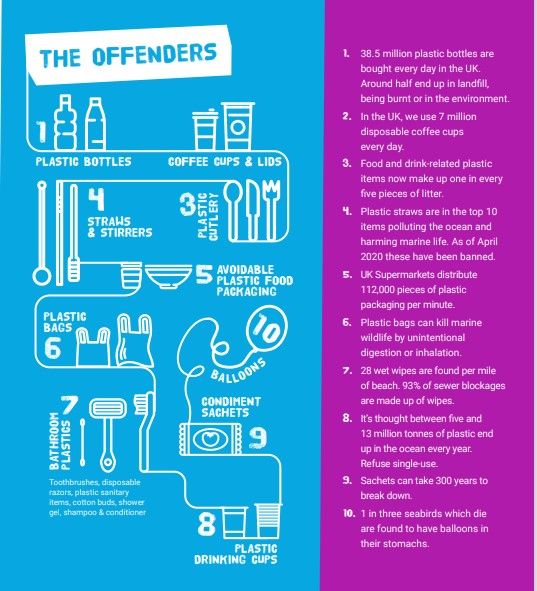Reduce & reuse Featuring plastic-free lady bay And, coming soon, reducing energy usage in our homes
recycling alone is not enough
This page presents the case for reducing plastic and other waste and is full of useful links. We welcome additional submissions. For the latest news from Plastic-free Lady Bay, click here for their Newspage on this site. or read on for more detail on the reasons why this is so important.
Waste reduction: thinking plastic
Different types of waste demand different solutions. Plastic waste is one of our biggest problems, but there are plenty of solutions within reach.
The problem is huge. Although we know that plastic waste is polluting rivers and oceans and being illegally dumped in poor communities abroad, the UK continues to produce more plastic waste per person than almost any other country. Only the USA is worse. The Government estimates that the UK uses 5 million tonnes of plastic a year, which means, roughly that every year we all get through our own body weight in plastic.
On top of this, plastic production is actually increasing - it’s set to double by 2040.
Only about 11% of our domestic plastic waste in the UK is currently recycled. That figures, because recycling has to be economically viable, and for most things, it just isn’t. It’s too expensive for plastic sorting companies to separate all the different types of plastic that all need their own specific treatment and then sell them at an attractive price to the businesses who could use them. That’s why the council is so restrictive in specifying the types of plastic we can put in our bins.
Recycling means downcycling. Unlike metals, which can be recycled over and over again, plastic degrades in quality, diminishes in quantity (yield loss), or both during each use and recovery. For more on the types of recycling, see our 'About' page
Towards solutions
Retail outlets encouraging waste reduction, re-filling and re-use
Click on this link to see our listing of local businesses that promote waste-reduction and re-use.
Victoria Repair Cafe meets every three months with a trusty team of experts, ready to repair anything. Held at the Holy Spirit Church on Victoria Rd, West Bridgford, NG2 7NT (off Melton Road) - more details on their Facebook page - https://www.facebook.com/victoriarepaircafe.
Greenpeace is also campaigning for reductions in single use plastic. Their focus is on research-based lobbying of supermarkets and politicians. Many Lady Bayers took part in the Big Plastic Count, (as did over 100,000 households UK-wide) to help Greenpeace convince the government, big brands and supermarkets to take ambitious action on reducing plastic packaging. Specifically, they want the government to set a target to reduce single-use plastic by 50% by 2025 (by switching to reusable options that work for everyone) and ban the dumping of our waste on other countries.
To help supermarkets play their part, Greenpeace has also produced a report that shows how to achieve the 50% plastic packaging reduction they are demanding (link to https://www.greenpeace.org.uk/resources/unpacked-supermarket-plastic-report/). The main culprits are fruit-and-veg packaging and single-use containers. Fizzy drinks bottles alone could be reduced by nearly 80% by using two methods: a refill system and a return scheme. (Coca-Cola implemented a system in Brazil that used an ordinary refillable PET plastic bottle across their drinks ranges. They offered people a discount on their next purchase when they returned their empty bottles. Bottle return rates were reported to be above 90% and bottles lasted up to 25 cycles before being recycled.). To learn more about what individual supermarkets are doing and what could be done next, see https://checkingoutonplastics.org/.
And now we have - Plastic Free Lady Bay. Volunteers in Lady Bay have taken first steps towards making Lady Bay a Plastic Free Community, under the umbrella of an initiative set up by Surfers against Sewage (link to https://plasticfree.org.uk/). Their stated aim is to “unite communities in the fight against single-use plastics. It’s not about removing all plastic from our lives. It’s about kicking our addiction to avoidable single-use plastic, and changing the system that produces it.” Look out for local events you can get involved in and have a look at their suggestions below.
Here are some suggestions for single-use plastics we can try to reduce.
- Get into the habit of carrying a refillable drinks bottle, a re-usable cup and a re-usable shopping bag. Keep them in your bag or near your front door, so that you can grab them when you’re going out.
- Support Zero Waste retailers. Take your tins, boxes and bottles to be refilled.
- Talk to friends, family and colleagues about the problem. Support Plastic Free Lady Bay.
- Have a close look at the ideas in the graphic (it does get bigger if you hover over it)
- Also look at our recycling by item pages, as these have some suggestions for individual items.
Further info
A cute, short video on the problem of single use plastic narrated by David Attenborough and suitable for children https://www.youtube.com/watch?v=aTcMPy6L88E
A very short video promoting refilling and re-using. https://www.youtube.com/watch?v=GMh1TCLGj8E
If you want some serious reading about waste, where its increase is leading us and what can be done, this New Scientist Article is clear and incisive: https://www.newscientist.com/article/mg25333730-800-the-end-of-waste-the-grand-plan-to-build-a-truly-circular-economy/. (Lady Bayers, you can read New Scientist along with many other books and magazines for free through West Bridgford Library, who will give you an ID and password for the Inspire network).
The Ellen Macarthur Foundation is a world leader in influencing people to think about using things sustainably, so that we can apply the future generations principle, that the needs of the present are met without compromising the ability of future generations to meet their own needs. https://ellenmacarthurfoundation.org/topics/plastics/overview
